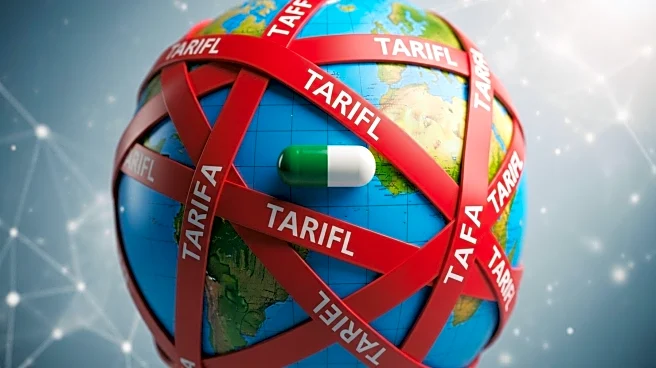What's Happening?
President Trump has announced a new tariff policy imposing 100% levies on imports of branded or patented pharmaceutical goods starting October 1, 2025. This move, communicated via social media, aims to encourage pharmaceutical companies to build manufacturing plants in the United States. The tariffs will not apply to generic drugs or companies that are currently building or planning to build production facilities in the U.S. This decision follows a national security probe into the possibility of imposing tariffs on pharmaceutical goods. The announcement has created uncertainty in the pharmaceutical industry, particularly concerning the distinction between branded and generic drugs and the criteria for exemption from the tariffs.
Why It's Important?
The imposition of these tariffs could significantly impact global pharmaceutical trade, particularly affecting countries like Ireland, Germany, Switzerland, Singapore, and India, which are major exporters of pharmaceuticals to the U.S. The European Union, which accounts for about 60% of U.S. pharma imports, may face increased costs and supply chain disruptions. While the tariffs aim to boost domestic production, they could lead to higher costs for U.S. consumers and limit access to certain pharmaceutical products. The policy may also prompt pharmaceutical companies to accelerate their plans to establish manufacturing operations in the U.S. to avoid tariffs.
What's Next?
Pharmaceutical companies are likely to assess their production strategies and consider expanding their manufacturing presence in the U.S. to circumvent the tariffs. The industry may also seek clarity on the exemptions and criteria for avoiding the tariffs. Meanwhile, countries affected by the tariffs, particularly in the EU, may engage in diplomatic discussions to mitigate the impact. The U.S. government may face pressure from both domestic and international stakeholders to refine the policy to balance national security interests with the need for affordable and accessible healthcare.
Beyond the Headlines
The tariffs could lead to a broader discussion on the ethics of using trade policies to influence healthcare costs and access. There may be legal challenges from affected companies and countries, questioning the compatibility of the tariffs with existing trade agreements. Additionally, the move could trigger a shift in global pharmaceutical supply chains, with companies reevaluating their production locations and strategies to adapt to the new trade environment.









